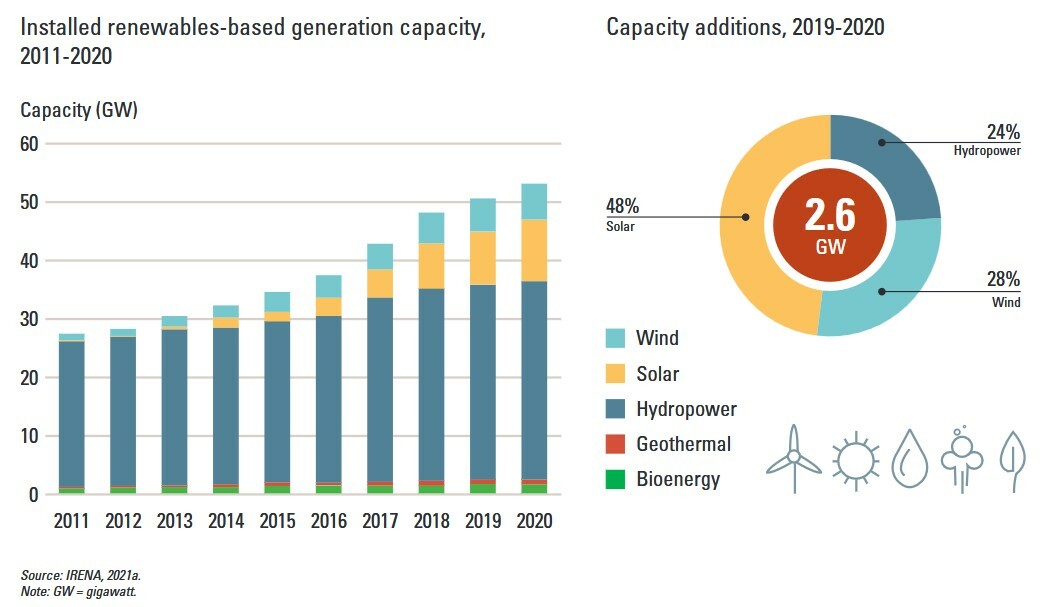Renewable energy in Eastern and Southern Africa: A lever for the healthcare cold chain
Accounting for about one-fifth of Sub-Saharan Africa’s electricity mix, renewable energy powers equipment and facilities which are crucial for health facilities, such as solar-powered refrigerating systems.
According to UNICEF, Africa currently accounts for less than 4% of global energy demand and 3% of electricity demand [1]. Despite significant progress in the electrification rate, significant gaps in access to energy remain, especially in rural areas of Eastern and Southern Africa (ESA), where only one third of the population has access to electricity.
In its “Regional Report on Renewable Energy for Health and Education in the Eastern and Southern Africa (ESA) Region” UNICEF explores the potential of various renewable energy (RE) sources, such as solar, wind, hydropower, and geothermal energy, across ESA nations.
Renewable energy currently accounts for about one-fifth of Sub-Saharan Africa’s electricity mix [1]. Southern Africa led the total renewable generation capacity in 2020 with 17 gigawatts (GW), approximately a third of Africa’s total, followed by North Africa with 12.6 GW. In Southern Africa, South Africa is by far the country with the most installed renewable capacity, with more than 14 GW installed. In North Africa, Egypt has installed close to 7 GW.

Energy access is paramount in achieving Sustainable Development Goals (SDGs). As such, unlocking the renewable energy potential in the ESA region is crucial, namely in the education and health sector.
There are several ongoing initiatives aimed at electrifying health facilities using renewable energy. Given the remote locations of many facilities, off-grid RE solutions are promoted as the most viable option. For instance, the use of solar-powered refrigeration systems integrating passive cooling devices reduces the costs of the vaccine cold chain, according to several studies. Using solar energy power generation systems, Buitendach et al. (2019) created a portable storage unit that lasts up to 72 h (3 days) with a temperature control accuracy of 1 °C and a capacity of up to 250 vials [2]. Satria et al. (2021) developed a more practical concept by making a storage unit in the form of a backpack with solar cells mounted on the outside [3].
Solar Direct Drive (SDD) refrigerators are commercial examples of vaccine refrigerators for off-grid areas. They use solar energy to freeze water or other cold storage material and then use the energy stored in the frozen bank to keep the refrigerator cold during the night and on cloudy days when energy is not available. So far, SDD refrigerators or freezers are the only type eligible for certification by the World Health Organization (WHO) for use in off-grid areas [4, 5].
International organisations, including IIR, are providing sustainable RE-powered equipment and facilities in Africa such as solar power water systems or solar-powered refrigerating systems.
Sources
[1] UNICEF. Renewable Energy for Health and Education in the Eastern and Southern Africa Region. https://www.unicef.org/esa/reports/renewable-energy-health-education-report
[2] Buitendach H., Jiya I.N., Gouws R. 2019. Solar Powered Peltier Cooling Storage for Vaccines in Rural Areas, Indones. J. Electr. Eng. Comput. Sci. 17(1):36–46. https://repository.nwu.ac.za/handle/10394/33508
[3] Satria M.H., Jaenul A., Gamayel A. 2021. Design of Solar Powered Vaccine Backpack, vol. 7; pp. 590–594. https://doi.org/10.2991/ahe.k.210205.098
[4] CLASP, & Sustainable Energy for All (SEforALL). 2021. Raising Ambitions for Off-Grid Cooling Appliances. https://www.seforall.org/publications/raising-ambitions-for-off-grid-cooling-appliances
[5] World Health Organization, & Fund (UNICEF), U. N. C. 2017. Solar Direct-Drive Vaccine Refrigerators and Freezers: Evidence brief (WHO/IVB/17.01). World Health Organization. https://apps.who.int/iris/handle/10665/254715
